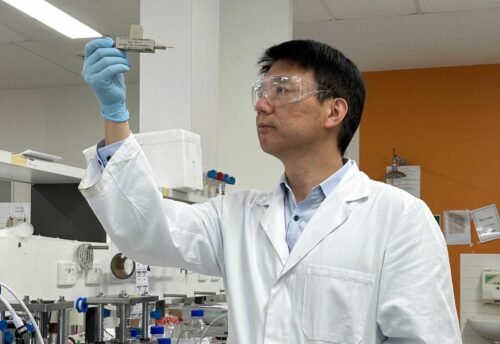Scientists at UNSW have developed an all-organic rechargeable proton battery using a novel material, addressing key challenges in energy storage.

An innovation at the University of New South Wales (UNSW), Australia has led to the creation of a rechargeable proton battery utilising tetraamino-benzoquinone (TABQ), an innovative organic material. This development, spearheaded by Chuan Zhao, professor, chemistry, UNSW and his team, highlights a significant shift toward sustainable energy storage by using hydrogen ions (protons) instead of lithium. Proton batteries, as demonstrated promise rapid energy storage, durability, and efficiency under freezing temperatures. Protons’ small ionic radius allows faster diffusion, making batteries with high energy density, fast-charging capability, and reduced environmental impact.
Conventional lithium-ion batteries, while prevalent, pose recycling challenges and rely on limited resources, causing environmental and economic concerns. “Lithium is a finite resource, and its uneven distribution worldwide makes it inaccessible for some regions,” noted Sicheng Wu, PhD candidate, UNSW. For industries reliant on efficient energy storage, such as electric vehicles, renewable energy grids, and portable electronics, this innovation offers a safer, cost-effective, and sustainable alternative to traditional systems.
The research team modified tetrachloro-benzoquinone (TCBQ) into TABQ by replacing chlorine groups with amino groups, significantly enhancing its capacity to store protons and lowering its redox potential. “We have developed a high-capacity small-molecule material for proton storage,” said prof. Zhao, emphasising its scalability due to its composition of abundant light elements. This advanced design improves the overall functionality and affordability of the battery, making it viable for widespread adoption.
The prototype proton battery, tested with a TCBQ cathode, delivered 3500 full charging cycles, exceptional cold-weather performance, and superior safety compared to lithium-ion batteries. Unlike flammable lithium electrolytes, this battery uses a water-based solution, making it lightweight and secure. With these attributes, the battery is suited for applications ranging from consumer electronics to large-scale renewable energy storage systems.
Researchers believe proton batteries hold immense potential for renewable energy integration and grid-scale applications. “We need efficient technologies for renewable energy storage, and our proton battery design is a promising step,” said Wu. The team plans to refine the cathode to improve voltage output and explore broader applications, such as hydrogen storage and transport. “Our discovery opens doors to broad energy solutions,” added prof. Zhao, highlighting its potential to establish sustainable energy systems globally.








